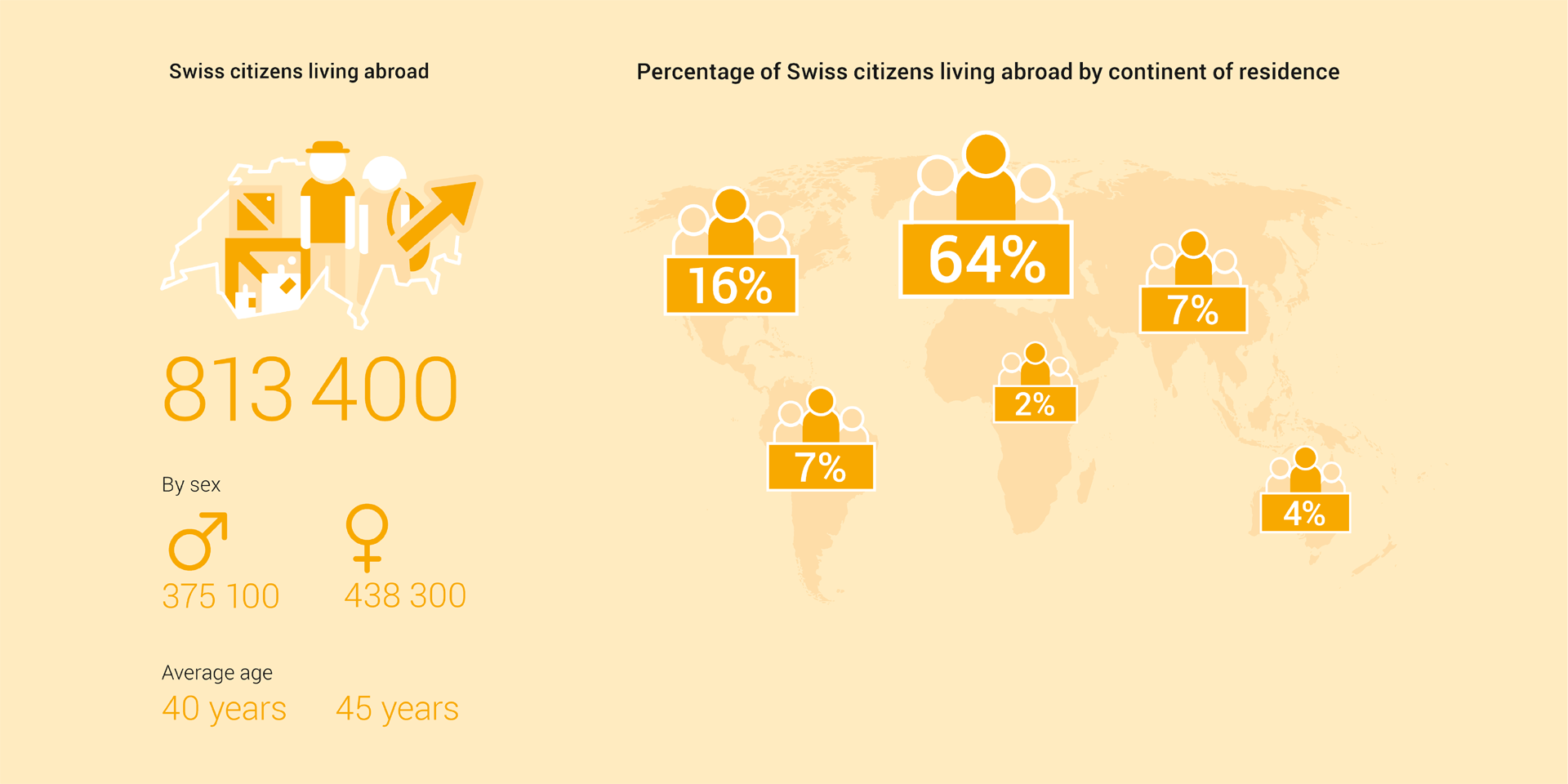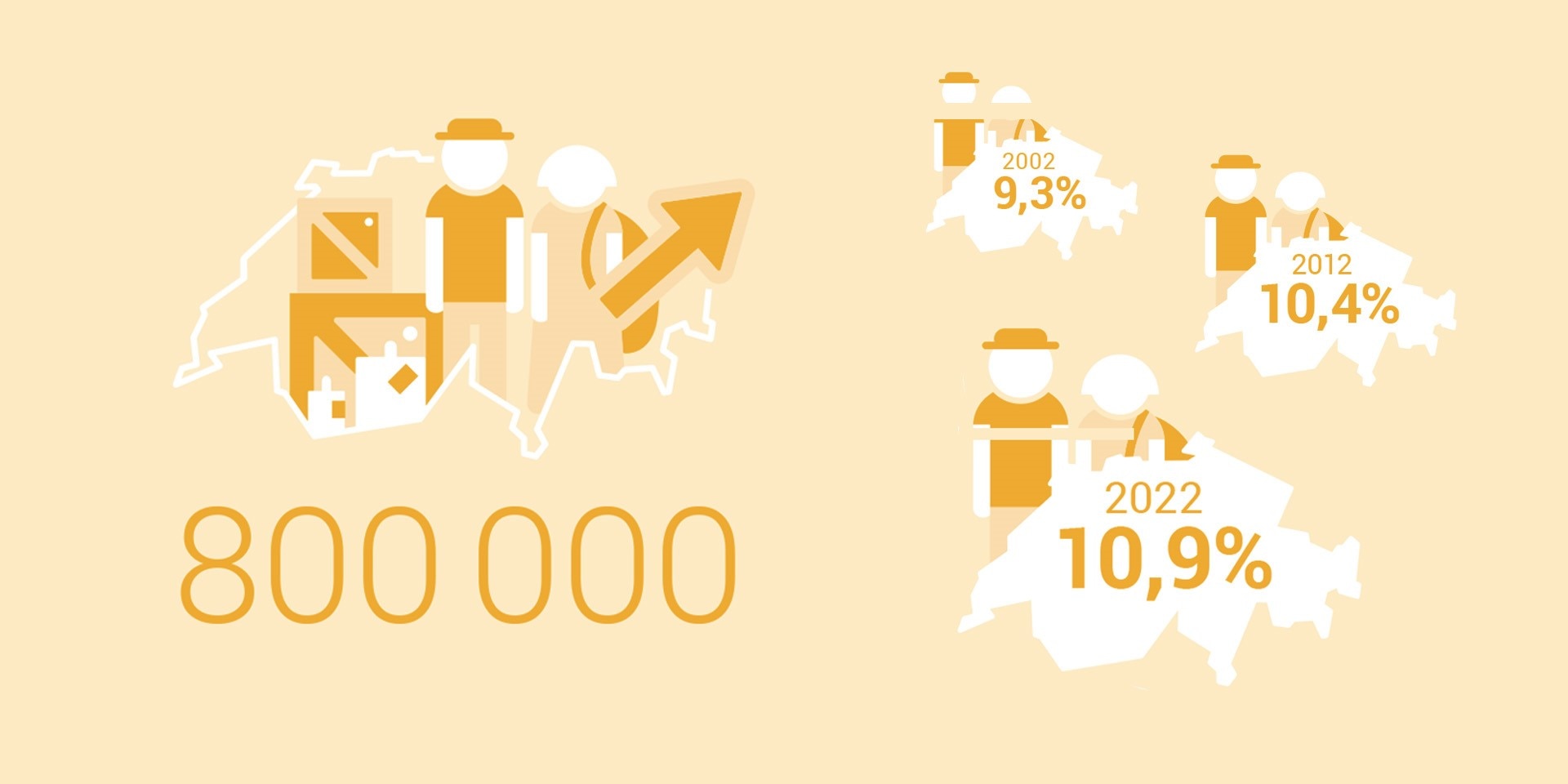Largest Swiss community abroad lives in Europe – trend rising
According to the Federal Statistical Office, around 11% of all Swiss citizens were living abroad at the end of 2023 – almost two-thirds of them in Europe. With an increase of 1.7% last year, the Swiss community abroad continues to grow in importance. The FDFA's Consular Directorate and its partners are constantly developing their range of services for the Swiss community abroad, most recently with the 'Ageing abroad' information and prevention campaign and the 'SwissInTouch' app.

According to the FSO, the Swiss community abroad grew by 13,400 in 2023. © FDFA
The growth trend of the last 30 years continues: according to the Federal Statistical Office (FSO), the number of Swiss citizens registering with a Swiss representation abroad increased by 1.7% in 2023, compared to 1.5% in the previous year. This increase was seen on all continents except Africa, where the number of registered Swiss citizens declined. Europe continues to be the most popular destination for Swiss emigrants, with France (209,300) and Germany (99,600) attracting the largest numbers. However, last year Spain recorded the biggest increase in the number of Swiss citizens among European countries. The number of Swiss citizens living abroad has increased across all age groups, with the largest growth seen in those aged over 65.
813,400 Swiss nationals are currently living abroad. "Our compatriots around the world provide us with valuable perspectives on the countries in which they live. Through their activities abroad, most of our compatriots enhance Switzerland's image and make positive contributions to the cultural and economic fields that underpin bilateral relations", says David Grichting, Director of the Consular Directorate at the FDFA.
The steady increase in the number of Swiss nationals living abroad impacts the work of the Consular Directorate. "Mobility is increasing all the time, which means that the needs of Swiss people abroad are becoming more diverse. We take this into account in our work," says Grichting.
Largest community of Swiss abroad in neighbouring Europe
The FDFA maintains a dense network of representations in the European countries with the biggest communities of Swiss nationals abroad – especially France, Germany and Italy. The FDFA also developed the SwissInTouch app, launched in 2022, to provide Swiss nationals abroad with a one-stop shop for information and resources on a wide range of topics relevant to their lives abroad.
With the 'Ageing abroad' prevention and information campaign, the Consular Directorate continues to provide targeted support for the growing number of Swiss citizens who decide to retire abroad. As part of this project, the Consular Directorate also runs webinars with its partners, the Organisation of the Swiss Abroad (OSA) / SwissCommunity and Soliswiss, on topics of particular interest to the Swiss community abroad, such as estate planning, OASI (Old Age and Survivors' Insurance), and health insurance abroad.
OSA activities
Founded in 1916, the OSA is dedicated to serving the needs of the Swiss community abroad and furthering their ties to Switzerland.
Three questions for OSA director Ariane Rustichelli

Ms Rustichelli, the number of Swiss citizens living abroad is rising steadily – by 1.7% last year compared to the previous year. How does the OSA ensure that the interests and needs of this growing community are recognised and optimally represented?
Our highest body is the Council of the Swiss Abroad, which represents the interests of the Swiss community abroad vis-à-vis the authorities and the public in Switzerland. The 140 members of the council – 120 from abroad and 20 from Switzerland – can submit resolutions which are then passed on to the Swiss authorities. As an organisation representing Swiss citizens' interests, we also work with the Swiss parliament. We have the support of the members of the cross-party parliamentary group for the Swiss abroad. The number of Swiss citizens living abroad is growing, and so is the population within Switzerland's borders. This makes it even more important that the members of the Swiss community abroad are well represented, their needs are heard, and they can exercise their political rights. Ahead of the 2023 federal elections, we outlined these needs in an election manifesto which addressed concerns such as securing the continued free movement of persons and the promotion and development of e-government. We passed on a total of seven items to the authorities, as well as to the political parties and candidates participating in the federal elections.
Last year, the FDFA launched its 'Ageing abroad' project and ran various webinars with the OSA and other partners. How has this instrument been received, and what feedback have you had from members of the Swiss community abroad?
The webinars have been one of our most effective instruments in recent years, and the feedback has been very positive. As part of the 'Ageing abroad' project, as many as 2,800 people have attended webinars on topics such as estate planning, health insurance and OASI. 'Ageing abroad' meets a need, as more and more people are moving abroad after retirement. Our collaboration with the FDFA and Soliswiss, an association that also supports the Swiss community abroad, allows us to reach a large number of people and, just as importantly, to share the costs of the webinars.
Nearly two-thirds of all Swiss citizens living abroad reside in Europe, most of them in France. Can you explain why that is?
Switzerland's high cost of living is one factor. Many Swiss citizens live in France, close to the Swiss border. They maintain close ties with Switzerland, many are cross-border commuters who work here, and they benefit from a lower cost of living in France. Moreover, there are large Swiss consulates in Lyon and Strasbourg. It's also important to note that around 75% of Swiss citizens abroad hold dual nationality.
Swiss Abroad Act
The Swiss Abroad Act, which came into force in 2015, defines the 'Swiss Abroad' as Swiss citizens who are not residents of Switzerland and who are registered in the Register of the Swiss Abroad. To exercise their political rights, Swiss citizens must also be registered in the electoral register.
The Consular Directorate oversees the implementation of the Swiss Abroad Act and maintains a strong partnership with the OSA.



